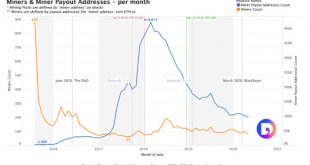The Proof-of-Work (PoW) consensus mechanism, which relies on crypto mining to validate transactions, is a pioneering concept that, in fact, pre-existed Bitcoin. But it is often criticized due to its environmental impact. Many proponents of clean energy consider high energy consumption to be an “Achilles Heel” for Bitcoin. The latest to weigh in on the matter was Solana’s co-founder, who gave his two cents on why BTC should make the transition. Anatoly Yakovenko, the...
Read More »Ripple Co-Founder Donates $5M to Environmental Campaign Against Bitcoin Mining
Chris Larsen – angel investor and co-founder of Ripple – is funding an environmental campaign to change Bitcoin’s code. Using his funds, a consortium of environmental groups will run ads across major newspapers to convince miners, software developers, and others to drop the network’s ‘proof of work’ consensus mechanism. Explaining Proof of Work To be clear, the environmental ‘lobby’ seeks not to end Bitcoin itself, but to see it shift toward a less energy-intensive security...
Read More »European Union Reportedly Votes Against Banning Proof of Work Cryptocurrencies
After weeks of debates and delays, the EU has voted against banning the use and mining of proof of work digital assets, such as bitcoin and ether. CryptoPotato reported earlier the Markets in Crypto Assets (MiCA) framework developed by the European Union, which had one rather threatening note that sought the de facto ban of PoW cryptocurrencies. The digital asset community, led by MicroStrategy’s Michael Saylor, opposed the draft, saying it could become a trillion-dollar...
Read More »The European Union Is No Longer Banning Bitcoin and Other PoW-based Assets
European Union lawmakers have removed a controversial paragraph that would have made all proof-of-work (PoW) based cryptocurrencies such as Bitcoin (BTC) and Ethereum (ETH) illegal. Proposed Ban on PoW-Based Coins Deleted The Markets in Crypto-Assets (MiCA) framework, headed by Economic and Monetary Affairs (ECON) rapporteur – Stefan Berger – was originally scheduled for February 28. However, due to the vehement opposition over the language on the passage, fearing that it...
Read More »ESMA Top Executive: The EU Should Ban Proof-of-Work Mining
The vice-chair of the European Securities and Markets Authority (ESMA) – Erik Thedéen – urged the EU financial regulators to prohibit the cryptocurrency mining model known as proof-of-work. He also claimed that bitcoin has turned into a “national issue” for his homeland Sweden because of the amount of renewable energy devoted to mining the asset. ‘The Solution Is to Ban Proof-of-Work’ In a recent interview for the Financial Times, Erik Thedéen (also Director-General of...
Read More »Ethereum 2.0 Staking on Exchange vs. Creating Your Node: What You Need to Know
The Ethereum Network recently saw the official launch of the Beacon Chain, which is a stepping stone to the long-awaited Ethereum 2.0 upgrade, aiming to improve network speed, efficiency, and scalability. It’s a move by the Ethereum foundation to abandon the Proof of Work (PoW) consensus algorithm for the energy-efficient Proof of Stake (PoS) consensus algorithm. On top of that, we have to change terminology from having miners to having validators.Ethereum 2.0 hopes to improve transaction...
Read More »5 Years of Ethereum Proof of Work: What Did We Learn?
Proof of Work, a consensus mechanism, has proved to be the backbone of some of the leading and widely-adopted blockchain networks. These include Ethereum, Litecoin, and, of course, Bitcoin.Many from the blockchain industry have wondered how come Proof of Work (PoW) remained so resilient over all these years. Some are even baffled by its resilience as it has withstood a long list of challenges like growth, performance, and security issues over the years.Key Takeaways From 5 Years of PoWThe...
Read More » Crypto EcoBlog
Crypto EcoBlog



